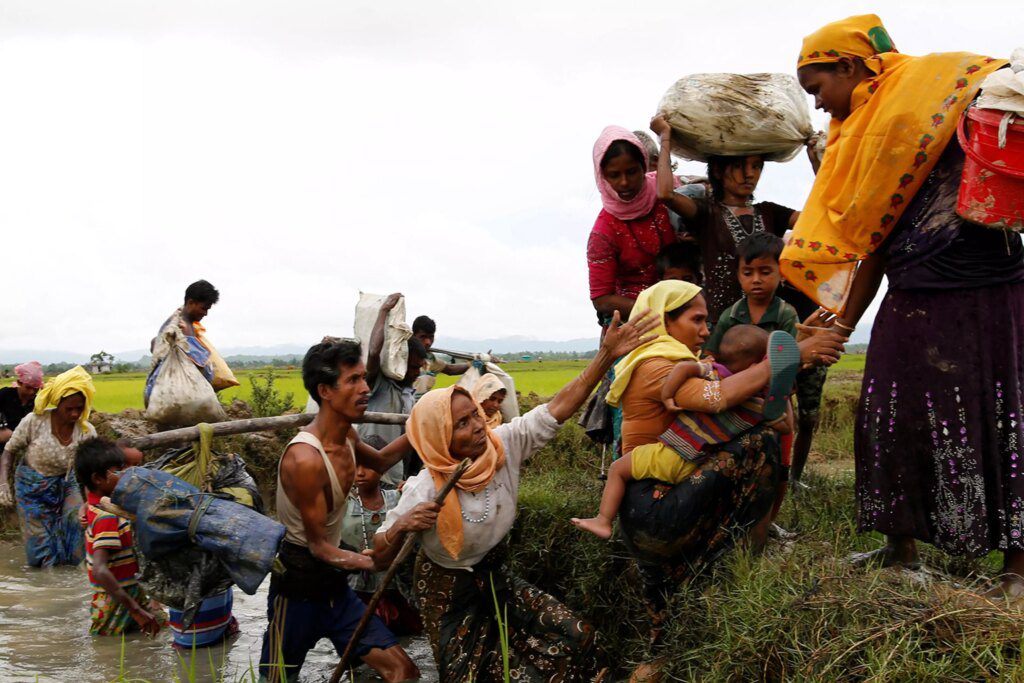The Rohingya crisis involves ongoing conflict in Myanmar’s Rakhine State, where the Rohingya people, a mainly Muslim ethnic minority, are facing persecution and discrimination. This crisis has been recognized as one of the worst humanitarian catastrophes of modern times. The tension between the Rohingya and the Myanmar government escalated in the late 20th century, leading to military crackdowns and violence against Rohingya communities. In August 2017, a major military operation by the Myanmar military resulted in the mass killing, rape, and displacement of Rohingya civilians. This crisis has led to hundreds of thousands of Rohingya fleeing to Bangladesh, creating overwhelming humanitarian challenges. The international community has condemned the violence but finding a resolution remains a significant challenge. A comprehensive and long-term solution is needed to address the discrimination and violence faced by the Rohingya and restore peace and stability in their homeland.
The Rohingya Crisis: Ethnic Conflict and Humanitarian Catastrophe
Introduction
The Rohingya crisis refers to the ongoing conflict in the Rakhine State of Myanmar (formerly Burma) involving the Rohingya people, an ethnic minority group of mainly Muslim individuals. This crisis has been recognized as one of the worst humanitarian catastrophes of modern times.
Historical Background
The Rohingya are a stateless, indigenous ethnic group residing in the Rakhine State, with a majority population of Rakhine Buddhists. Their history in Myanmar can be traced back to the 8th century, with migration from Bengal (now part of present-day Bangladesh). For centuries, the Rohingya coexisted with other communities in the region, although they have faced persecution and discrimination throughout history.
Escalation of Conflict
The tension between the Rohingya and the Myanmar government escalated in the late 20th century. The government officially denies recognizing the Rohingya as an ethnic group, claiming they are illegal immigrants from Bangladesh, despite their centuries-old presence in the area. The Rohingya have been subjected to restrictions on their rights and citizenship, rendering them stateless and vulnerable.
Military crackdowns, violence, and displacement of Rohingya communities have been recurrent occurrences since the late 1970s. However, the crisis reached its peak in August 2017 when the Myanmar military launched a major military operation against the Rohingya following an attack on security forces by a Rohingya insurgent group. This brutal crackdown resulted in the mass killing of Rohingya civilians, rape, and the burning of their villages, ultimately leading to a mass exodus of Rohingya refugees into neighboring Bangladesh.
Humanitarian Catastrophe
The Rohingya crisis has resulted in an overwhelming humanitarian catastrophe. Hundreds of thousands of Rohingya have fled their homes, seeking safety and shelter in Bangladesh’s Cox’s Bazar district, one of the most densely populated areas in the world. The makeshift refugee camps lack basic amenities such as clean water, sanitation, healthcare, and education. This has led to the spread of diseases, malnutrition, and a severe lack of access to essential services.
International Response
The Rohingya crisis has garnered international attention, with numerous humanitarian organizations, governments, and the United Nations condemning the violence and calling for action. However, a lasting solution has yet to be implemented, and efforts to hold the perpetrators accountable for their crimes have been limited. The geopolitical complexities surrounding this issue, including economic interests and political alliances, have hindered progress in finding a resolution.
Conclusion
The Rohingya crisis continues to be a recurring nightmare for the Rohingya people and a major challenge for the international community. It highlights the urgent need for a comprehensive and long-term solution that addresses the systematic discrimination, violence, and displacement of the Rohingya. The world must work together to ensure the protection of the rights and dignity of the Rohingya and find a way to restore peace and stability in their homeland.
